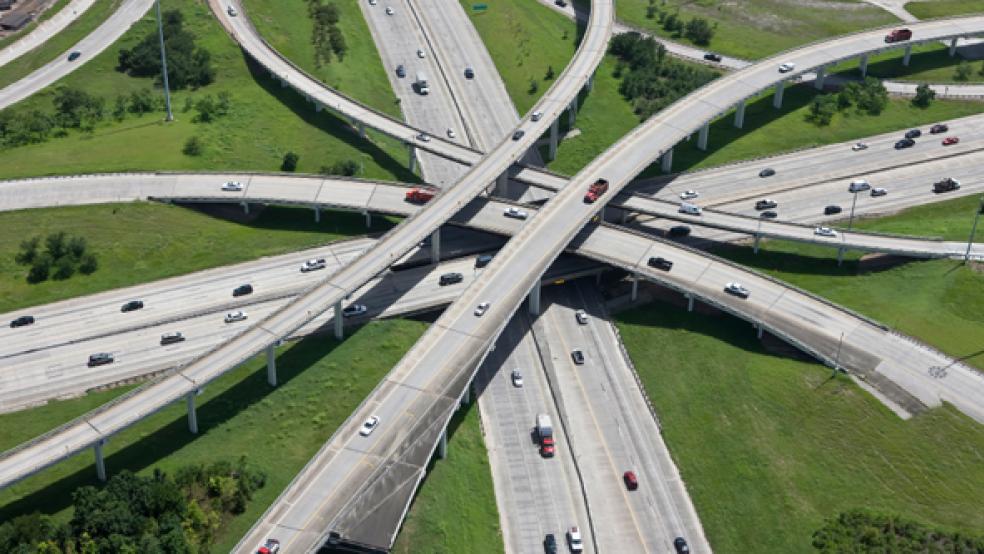Senate Democrats and Republicans rejoiced Tuesday night: They had banded together to pass a version of a short-term highway trust fund bill that would do more than merely kick the can down the road for another year before facing up to the festering problem of inadequate funding for the nation’s infrastructure program.
Rather than extending highway, bridge and mass transit spending by nearly $11 billion through May 2015, as the Republican-controlled House prefers, the Senate voted 79 to 18 to keep $8.1 billion in federal funds flowing to the states through Dec. 19.
Related: Why the Senate Will Pass the House’s Highway Bill
“It was a tremendous victory,” Sen. Bob Corker (R-TN) gushed today during a breakfast with reporters and policy experts sponsored by The Wall Street Journal. “People were actually on the Senate floor debating something and pushing for a rationale to actually solve problems.”
The Senate won’t have much time to savor its victory, however. House Speaker John Boehner will make hash of the bipartisan measure and force the Senate to bend to the will of the House before adjourning later this week for the rest of the summer.
Still, Corker, a prominent player and deal-maker on Capitol Hill who may harbor presidential ambitions, pronounced the Senate action a stirring triumph that may be a precursor to more ambitious bipartisan action down the road.
Related: Clock Ticks for States on Highway Funding
“Leadership on our side whipped heavily against it,” Corker explained. “The fact is that people rose up and said, ‘No, we want to solve this problem. We want to try to deal with it before the end of the year.’”
Corker teamed up with Senate Environment and Public Works Chair Barbara Boxer (D-CA) and Sen. Tom Carper (D-DE) to rewrite the approach approved by the House last week. It would limit the highway spending “patch” through mid-December, jettison a major funding gimmick involving pension tax law, and set the stage for a post-November election legislative showdown over the federal highway program’s future.
“By an overwhelming vote, the Senate agreed to extend surface transportation programs until December 19th, which will ensure that the Congress comes together as soon as possible to put together a multi-year bill,” Boxer said in a statement. “Our bill also turns away from smoke and mirrors by doing away with ‘pension smoothing,’ which is a dangerous gimmick that could lead to pensions being underfunded.”
For all the celebration and self-congratulations by Republican and Democratic senators, the bipartisan victory is likely to be short-lived.
Even before the Tuesday night action, House Speaker John Boehner vowed to “strip out” the Senate-passed provisions once they reached his chamber and send back the House-passed bill on a “take it or leave it” basis, according to Roll Call.
Since few lawmakers would be foolhardy enough to depart for a five-week summer vacation without first approving more highway funding, the Senate likely will have no choice but to bow to Boehner’s demand and grant final approval to the House-passed bill.
Related: Congress Uses Accounting Gimmicks to Fund Highway Bill
Corker, Boxer and others say the government has been foolhardy in its piecemeal approach to funding highway and mass transit programs – and has shortchanged the economy and saddled future generations with the cost. The highway trust fund has operated on an 18.4-cents-per-gallon federal gas tax that hasn’t been raised since 1993. The tax generates about $39 billion a year right now, but the trust fund faces annual shortfalls of roughly $20 billion; owners of more fuel-efficient vehicles are paying less into the fund while construction costs rise.
The Obama administration and a number of lawmakers have floated ideas for underwriting the cost of future federal highway spending. Corker, for example, has pushed the idea of raising the gas tax by 12 cents per gallon over the next two year and pegging future gas tax adjustments to the cost of living.
Unless Congress votes to replenish the highway trust fund, the Department of Transportation warns it will start scaling back or cutting off highway funds.
Such a move would force state and local governments to delay or cancel more than 100,000 new highway, bridge and mass transit construction projects this summer – likely killing off 700,000 construction industry jobs, according to Secretary of Transportation Anthony Foxx.
Related: 700,000 Jobs at Risk If Highway Trust Fund Falters
After last night’s Senate action, Sen. Orrin Hatch of Utah, the ranking Republican on the Finance Committee, called it a “free vote” or a feel-good vote, according to Roll Call. Senators knew before casting their votes that Boehner will make good on his threat to strip out the Senate language – leaving the Senate no choice but to go along with the House’s action.
Corker today didn’t dispute the notion that the House would prevail in this latest confrontation, but he took strong issue with the idea that last night’s vote was a “free” or “feel-good” vote with no larger significance.
“Regardless of the outcome over the next few days, it was not a feel good vote,” he said. ”Leadership was whipping heavily against it. It doesn’t feel good for a lot of people to vote against the leadership. It was a vote of people saying, ‘Look, we’ve got to begin solving these problems.’”
Top Reads from The Fiscal Times:





